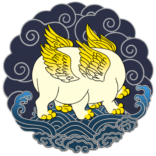In Southern regions of China such as 浙江 Zhe Jiang and 安徽 An Hui provinces, there is a tradition of consuming slightly decomposed foods. From amaranth roots, winter melon, bamboo shoots, to tofu, eggs, and fish. Some people are very addicted to their stinky odor, while others feel disgusted by it.
There is a famous dish called “Triple Stinky” in 寧波 Ning Bo city in Zhe Jiang, made with decomposed red amaranth roots (amaranthus mangostanus), winter melon (benincasa hispida) and tofu. It is not hard to imagine the hellish odor of rotten proteins. I remember dining at a Zhe Jiang cuisine restaurant, when they served steamed stinky tofu behind me, I screamed: “Who is so rude to open the bathroom door at mealtime!!!” It was so pungent that I felt like vomiting, yet people around me appreciated that dish enough that I felt curious enough to give it a try…… It didn’t end well.
Another time when I visited An Hui, no matter where you go, there is always at least one stinky dish served to your dining table. Their famous pork belly with stinky bamboo shoots or stinky tofu stew is still my nightmare. I ate them because I was stuck on a high snow mountain for a week.There was nothing but stinky stews…….it is interesting that people who have been eating them since childhood cannot have enough of that odor. To them it is a gourmet.
Now I haven’t seen anybody still make stinky eggs nowadays, but in the past, it was a popular dish in the south. Nothing smells worse than rotten eggs except dead corpses. In medieval ages people threw them at others to express despise — which in my opinion is the only correct way to use rotten eggs. People of older generations put fresh eggs in a sealed ceramic urn and bury it underground for months before eating them. It makes me wonder the benefit of eating decomposed foods.
Eating decomposed foods is not limited to Chinese cuisine. Japanese has a tradition of making mildly decomposed soy beans, 納豆 Nattō, and squid; Vietnamese ferment stinky fish and shrimp sauce; French eat super stinky cheeses, etc. It makes me wonder why people find stinky foods attractive.
Modern science is convinced that eating rotten foods causes food poisoning and should be strictly avoided. Agreed. However, in reality it does not seem to be 100% truth. In Chinese medicine belief, mildly decomposed foods are good for the Yangming system, which is roughly equivalent to functions of the microbiomes in our gut. We all know that the micro-organisms in fermented foods assist the body digest and absorb nutrients, because they are already broken down a little. When it turns stinky, it descends into deeper layers of the body. The pre-Qin books 「月令」and「白虎通」state that “The odor of the North is putridity. Why? Because Water phase from the North is where the ten thousand things are stored in the darkness. Water receives dirt and turbidity; therefore its odor is putridity and decay.” also has the same statement.
「北方其臭朽者何?北方水,萬物所幽藏也。又水者受垢濁,故臭腐朽也。」
「白虎通」also points out that the characters for the four directions indicate their energetic qualities (the roughly matching tones of the characters are index of their correlation): 東 Dōng = 動 Dòng movement, activity — East is where the ten thousand things begin to generate. 南 Nán = 養 Yáng, nourishment, cultivation (it is also the direction of the Fire phase) — South is where the ten thousand things brew life force. 西 Xī = 徙 Xǐ departure, migration — West is where the ten thousand things depart and descend. 北 Běi = 背 Bèi embrace, Yīn — North is where the ten thousand things hide in darkness and hibernate.
所以名之為東方者,動方也。萬物始動生也。南方者、任養之方,萬物懷任也。西方者、遷方也。萬物遷落也。北方者、伏方也。萬物伏藏也。——「白虎通」
This explains why rotten flavor is originated from and popular in the South. The storing ability of the North tends to be deficient in the South, and eating such foods helps the body store essence into the Kidney.
Modern lifestyle also contributes to 相火不藏 Ministerial Fire Not Restored. Recently I got a stew recipe also named 三臭 “Triple Stinky,” which is even more extreme than the 寧波 Ning Bo version:
The main ingredients are pork large intestines, which is not rotten but its interior is not thoroughly cleaned, the odor of its content remains; hairy stinky tofu, and 人中白 Ren Zhong Bai. Hmmmmmmmmm……YUM!
Large Intestines belong to Yangming Metal, pork LI assists Metal to generate Water. The odor of fecal matter sends signals to our body that this is waste that needs to be eliminated. Eating this will help our healthy bowel movement. Soy (and all of the legumes) is a Yin food, making it slightly decomposed helps the nutrients descend and store in the Kidney. Ren Zhong Bai is crystalized human urine (don’t think about where it is collected !!!). Because it is a mineral accumulated over decades, it does not have the pungent odor of fresh urine, and it has strong descending Qi that resonates perfectly with the human body. Our body would be signaled to purge it immediately when you eat it. This is a great medicine for cleansing the urinary system.
Our body is a pattern storing and releasing machine. Sometimes it forgets to release patterns and keeps holding onto expired patterns that do not belong to us anymore. These old memories can manifest as physical lumps, nodules, stones, tumor, etc. This recipe reminds our body to let go of useless materials accumulated in us over time. Maybe it is time to renew our conception of stinky foods and give it a try?
Do you enjoy stinky foods? If so, what do you like?

